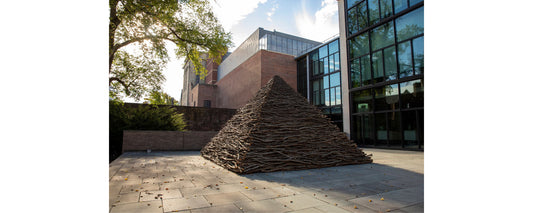Beethoven had been deaf for 20 years when he wrote his String Quartet in A Minor, Op. 132—“one of the greatest string quartets,” cellist Philip Boulanger told a masked audience of 150 in the warmly lit, wood-paneled sanctuary of the Unitarian Society of New Haven on October 30. They had gathered to hear that masterpiece performed by the Haven String Quartet, in its first performance since the pandemic began.
Beethoven’s quartet was a poignant choice. It includes a third movement titled “Heileger Dankesang eines Genesenen an die Gottheit, in der Lydischen Tonart,” or “Holy Song of Thanksgiving by a Convalescent to the Divinity, in the Lydian Mode.” Beethoven had just recovered from a near-fatal illness when he wrote this composition, centering it around what Boulanger called a “sprawling, 20-minute prayer” consisting of “three slow chorales that are interrupted with pure joy.” To help the audience better appreciate what they’d be hearing, Boulanger’s introductory remarks were accompanied by a preview of several bars of music, eliciting appreciative murmurs from concertgoers in the otherwise silent moments between music and speech.
sponsored by
Then, bows raised and bright in the overhead lights, the quartet entered into their performance with the first simple notes of the cello, joined from the lower register up by viola, then violins, before plunging into the first expression of a theme that would return, as Boulanger had promised, again and again. “We sort of pass it back and forth, we converse on it, sometimes we disagree on it, sometimes we argue about it, and sometimes we come together in sort of a moment of triumph or despair together with this theme,” Boulanger had told the audience. Indeed, it was interesting to listen for those very moments he had described. But at some point, the music transcended all description and began to simply breathe, as if it were itself alive. The famous third movement was played with such tenderness and sincerity that the music seemed to be laying its own emotions bare before us.
The Haven String Quartet is one element of the programming at Music Haven, a tuition-free afterschool music education program for children in first grade to high school who come from several “promise zones” throughout New Haven—areas designated as having high rates of poverty. The quartet’s musicians—Boulanger on cello, Annalisa Boerner on viola and Yaira Matyakubova and Gregory Tompkins on violin—provide instruction to 15 to 20 young musicians each and conduct ensembles large and small, along with another conservatory-trained musician, Patrick Doane, who sometimes performs on concert programs as well. Boulanger also serves as Music Haven’s education director and Tompkins as its business manager. Boerner runs a College and Career Pathways Program, teaching older students to mentor younger ones and helping each upcoming graduate to create a future plan. Matyakubova has resurrected a Music Bridge program welcoming the children of recent immigrants and refugees with free music lessons. In keeping with its educational purpose, each concert begins with a student performance. That night in October, cellist Maëlle Davenport played Minuet I from Bach’s Suite No. 1 in G Major.
This season’s concert repertoire, created collaboratively by all four members of HSQ, highlights the cultural diversity in classical music by drawing attention to several important composers who are less well-known by the listening public, placing them side by side with some perennial favorites. The next concert, on December 11, will feature works by Nicholas Lell Benevides and Samuel Coleridge-Taylor (often described in his time, violist Boerner says, as “the African Mahler”), as well as the world premiere of Suite de Canto y Danza en Forma de Variaciones by Luis Prado, commissioned by Music Haven. In addition, paintings by local artist Miguel Angel Mendoza will be on view before and after the performance. Concerts coming up in February, March and May will feature works by Jessie Montgomery, Aaron Copland, Colin Jacobsen and Siamak Aghaei, Caroline Shaw, Paquito D’Rivera, Johannes Brahms, Carlos Simon and Claude Debussy. Tickets are “pay what you can,” with a suggested donation of $25 per ticket or $125 for the full season. Ticket sales for HSQ concerts support Music Haven’s programming, both in the quartet’s regular New Haven season and at other concerts locally and regionally.
Violinist Matyakubova has been with Music Haven since its “infancy” in 2009, three years after it was founded by Yale School of Music graduate Tina Lee Hadari. She stayed because of the “inspiring and challenging” work of the quartet which, unlike most, works together on a daily basis, both in rehearsal and with the children and families who make up Music Haven. “We think of the quartet as our second family because we play so much together, because we work, we rehearse, we think, we grow, we develop in a similar path,” Matyakubova says.
Music Haven’s kids are perhaps the quartet’s most valued audience. When they played a preview of the Beethoven piece for a group of students, the children “had so much to say about the music afterwards, were so excited about it,” says Mandi Jackson, Music Haven’s co-executive director of advocacy and programs. “I don’t think they know yet how unique it is to be able to hear music played at that level just right in front of them.”
The adults in HSQ’s October audience were appreciative, too. The title of that concert, “Feeling New Strength,” comes from one of Beethoven’s notations to the musicians in the third movement. “
Haven String Quartet
Erector Square – 315 Peck St, New Haven (map)
(203) 745-9030 | info@musichavenct.org
HSQ Concert Schedule | Music Haven Concert Schedule
Written by Kathy Leonard Czepiel. Image, featuring the Haven String Quartet’s Gregory Tompkins, Philip Boulanger, Annalisa Boerner and Yaira Matyakubova, photographed by Maher Mahmood and provided courtesy of Music Haven.








